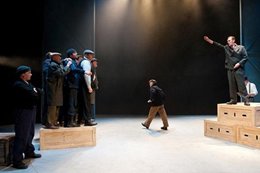The year is 1981. The economy is in a bad way, jobs are in short supply and in London there is a royal wedding. Sounds familiar, doesn’t it? It was also the year in which a scruffy young Belfast writer took his first faltering steps into the world of professional theatre, when his play about the working class community in which he grew up was produced at the Lyric Theatre.
The writer was Martin Lynch. The play was Dockers. That landmark production, directed by Sam McCready, saw Louis Rolston turn in, arguably, one of the most memorable performances in his long career as the drunken but principled scrounger Buckets McGuinness. In 1992, the theatre’s then artistic director Charles Nowozielski staged an entertaining revival with a cast led by the late John Hewitt. Almost twenty years on, it is being honoured with a lavish 30th birthday revival as part of the newly rebuilt Lyric’s celebratory opening season.
It is a big, rambling, earnest piece, weighed down with long speeches and political polemic, very much an early work by an aspiring writer. Still, from the start, its integrity, fearlessness, energy and essentially Belfast humour proved hard to resist. Cast in the mould of Sam Thompson’s controversial Over the Bridge, which had lifted the lid on sectarianism in the shipyards of Harland & Wolff on the other side of Belfast Lough, Dockers was to be a catalyst for a new wave of Northern writer, most notably the plays of Marie Jones for Charabanc Theatre Company.
A former docker like his father before him, Lynch put heart and soul into his drama about the struggle for workers’ rights within the unskilled, largely Catholic labour force, which handled the cargo on the deep sea vessels and cross-channel boats going in and out of Belfast harbour. These were men with families and responsibilities, forced to scrabble like animals for a day’s work, meted out by hard-faced slave drivers of foremen, who treated them like commodities rather than human beings.
Given that working people are still without rights or representation in many parts of our so-called civilised world and that the economic and social resonances of 1981 chime so resonantly with our own times, one would have hoped that Andrew Flynn’s large-scale production would have looked to reach out to modern day audiences coming to the play for the first time.
 It opens spectacularly, with the total height and width of the Lyric’s vast new stage being used by designer Brien Vahey to create an atmospheric quayside scene, a mist swirling gently around a ghostly line of dockers, silhouetted against the great silent hull of a cargo ship.
It opens spectacularly, with the total height and width of the Lyric’s vast new stage being used by designer Brien Vahey to create an atmospheric quayside scene, a mist swirling gently around a ghostly line of dockers, silhouetted against the great silent hull of a cargo ship.
But as proceedings unfold, one is struck by a sense that the cast, mainly comprised of quality Northern actors, have not been sufficiently challenged to breathe new life and meaning into their roles as labourers, bosses, union officials, bartenders and assorted female hangers-on. In what is essentially an ensemble piece, there is scant sense of a tight-knit, inward-looking community, too many lines disappear into thin air and the unfolding drama feels predictable and lacking in tension.
While the newly elected union committee member John Graham constitutes the conscience of the play, Buckets McGuinness is its heart. Glen Wallace plays the former not as a firebrand but as a quietly determined, mild mannered aspiring intellectual, torn between taking on the bullying bosses on behalf of his fellow workers and responding to the persistent demands of his wife Theresa (Roisin Gallagher).
As Buckets, Garrett Keogh appears unhappily miscast and overly preoccupied with the Belfast accent and strutting body language. His tall tales, bad jokes and lofty pronouncements would be far more effective if delivered in his own natural voice. Apart from a few diction glitches, Paddy Jenkins does well as wise, world--practices-the-jive-with-Hugh-McNamara-(Andy-Moore).aspx%3Fwidth=260&height=173) weary Legs McNamara, while Andy Moore puts in a nicely measured performance as his son Hughie, in spite of being involved, with Gallagher, in an excruciating dance sequence around a cramped living room set, reminiscent of the early days of am dram.
weary Legs McNamara, while Andy Moore puts in a nicely measured performance as his son Hughie, in spite of being involved, with Gallagher, in an excruciating dance sequence around a cramped living room set, reminiscent of the early days of am dram.
Marie Jones returns to her acting roots as the all-knowing moneylender Sarah Montague. Her every appearance, meekly accompanied by her obedient sidekick Mary Ann McKeown (Julia Dearden), elicits loud laughter from her fans in the audience.
Such is the Northern public’s affection for Dockers and its writer that this production may well do good business at the box office, but one can but conclude that if there is nothing new and fresh to be brought to its revival, it is probably best to let this brave old warrior of a play rest in peace.
Jane Coyle is a Belfast-based arts journalist, critic and screenwriter, who also reviews for The Irish Times, Culture Northern Ireland and The Stage.